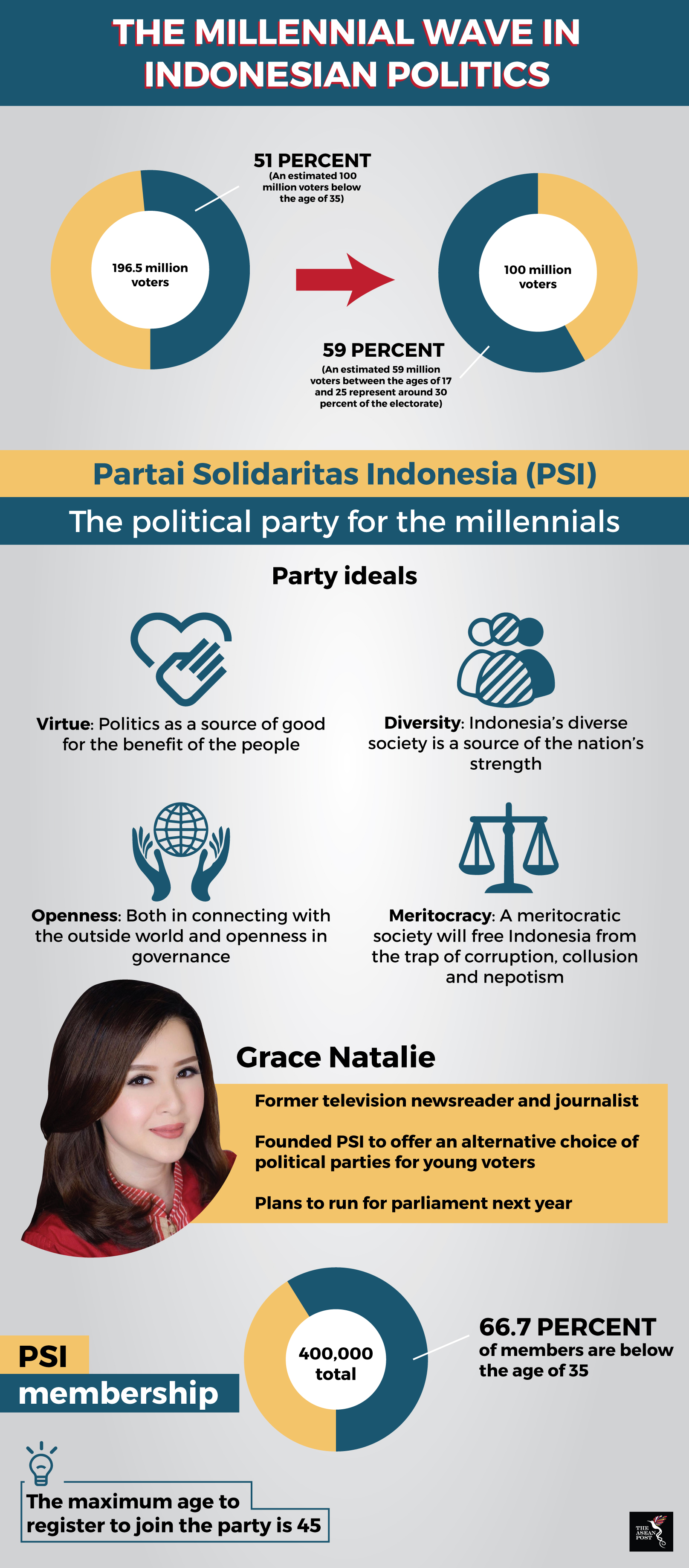Can the millennial wave shape the future of Indonesian politics? The younger generation in Indonesia want their voices heard. And the chance...
The younger generation in Indonesia want their voices heard. And the chance to do so will come when they head to the polls - once this year for local elections and again in 2019 for legislative and Presidential elections which take place concurrently.
Millennial voters remain a critical demography in Southeast Asia’s largest democracy. Since 2004, the youth voter bank â€" accounting for people between the ages of 17 and 25 â€" has increased from 18 to 30 percent. Today, more than half of the 196.5 million strong Indonesian electorate is made up of voters below the age of 35.
A political party by millennials
The burgeoning power that youths have over the sway of electoral results has prompted the rise of a new political party, which caters mostly to the youth demography. Partai Solidaritas Indonesia (PSI) â€" which stands for Indonesian Solidarity Party â €" was founded by a 35-year-old former journalist, Grace Natalie on a plural and progressive platform.
Three years since its inception in 2014, the party’s membership has swelled from 23,000 members to approximately 400,000. Of that number, about two thirds are below the age of 35. The party also implements a maximum age of 45 for registration and strives to maintain a 30 percent women membership.
Earlier this year, PSI was given the go ahead by the General Election Commission to contest in upcoming elections next year. Ever since, PSI has ramped up its campaign which primarily takes place online. The party has a strong social media presence and actively disseminates information on its activities and candidates via its official Facebook, Twitter and Instagram handles.
Its main selling point to the youth demography is the use of an overarching “out with the old, in with the new†theme. PSI’s public policy platform hinges primarily on initiating institution al reform and to get rid of clientelism and patronage politics which has become synonymous with the older parties in the country. Hence, only the newer generation of young professionals are better predisposed to change this image and herald in a new age of modern and transparent politics in Indonesia.
On the issue of religious freedom and civil liberties, PSI advocates a more liberal stance calling for the abolishment of prejudiced regulations. Religious radicalism which has seen a resurgence in Indonesia is a core concern that the party must deal with. In a survey of 4,200 Muslim students by Jakarta-based pollster Alvara, 20 percent were for the establishment of an Islamic caliphate and close to 25 percent were willing to wage a jihadi war to achieve that.

Source: Various sources
Nevertheless, PSI is a long way from becoming a formidable political force in the country. Its party’s s tance on matters like economic development, unemployment, healthcare and rural agriculture is still largely idealistic, thematic and vague with no palpable solutions driven policy. Besides that, the party occasionally faces communication issues between its top brass and grassroots membership which it still struggles to manage at times. For instance, some of its members in West Java previously openly stated their support for the formation of an anti-LGBT force which goes against the grain of PSI that promotes tolerance and upholds the civil liberties of all. PSI has since apologised for their actions.
Youth voter apathy
At 17 years, the legal voting age in Indonesia is one of the lowest in the world and is the lowest among other members of the Association of Southeast Asian Nations (ASEAN). Nevertheless, participation of youths in the electoral process has always been tepid.
According to data from the Indonesian elections commission, less than half of voters aged between 17 and 29 years, voted in the previous 2014 elections; compared to over 90 percent of those aged above 30 who cast their ballots.
Ella Prihatini, a researcher attached to the University of Western Australia found in a survey of 253 young voters that Indonesian millennials were still very much in favour of voting for a personality as opposed to voting based on a party’s ideology. About 61 percent of respondents claimed to vote for a party based on its leader. Furthermore, a majority expressed their support for longstanding parties over newly established ones with the latter only popular amongst 31 percent of respondents.
This represents a monumental task for the likes of PSI which has been vocal about changing such a mindset and moving towards voting based on ideology instead of personality. Only about 5 percent preferred PSI over other political parties, compared to 33 percent who opted for Indonesian President Joko Widodo’s Partai Demokrasi Indonesia Perjuangan (PDIP). Nevertheless, PSI can hope to leverage on its close ties to Widodo, having endorsed him as their pick for President next year.
If PSI can secure 30 percent of the electorate which consists of voters below 25 years of age it would grow to become an integral player in the overall landscape of Indonesian politics. Right now, its position as the cure for the apathy of Indonesia’s youth towards politics has yet to be tested.
Source: Google News